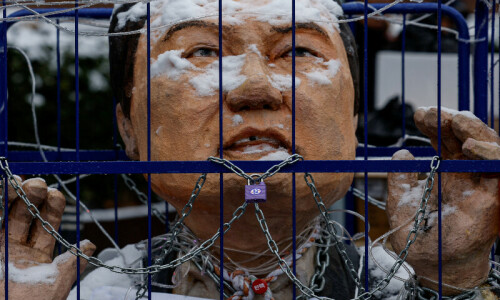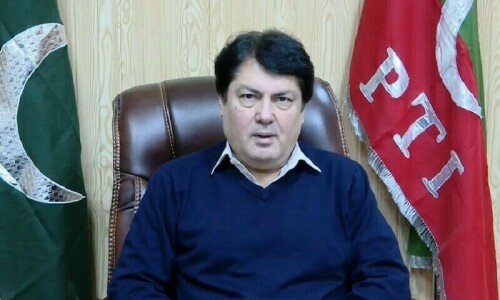MUZAFFARABAD: A largenumber of employees of the previously federal government funded Maternal New-born and Child Health (MNCH) programme continued their sit-in on the sixth consecutive day here on Saturday to press the state government to regularise their services and bring them on the normal budget.
The venue of the demonstration was a green belt in Chattar neighbourhood which houses almost all important official buildings, including the offices of the prime minister and his cabinet, civil secretariat and both superior courts.
Most of the protesters were women, who had travelled from different parts of state to attend the protest demonstration in state capitalMuzaffarabad - fourth since 2020.
Sajid Azeem, head of the employees’ action committee, toldDawnthat as many as 1,218 employees - 80pc of them women - were inducted in thefederal government funded MNCH programme in AJK some 16 or so years ago against the positions of managers, doctors, lady health visitors (LHVs), community midwives (CMWs), clerks and drivers, etc.
Following the 18th Constitutional Amendment in Pakistan, all provinces as well as AJK and GB were asked to shift these positions to their normal budgets, he said. However, he lamented,while the provinces and GB implemented that decision, AJK could not fulfil its commitment in this regard.
Mr Azeem claimed that two former AJK premiers Sardar Abdul Qayyum Niazi and Sardar Tanveer Ilyas had adopted a positive approach towards them by approving the shifting of all MNCH positions to the state’s normal budget.
The AJK finance department gave concurrence for inclusion of only 348 posts in the normal budget in December 2022, but no notification to this effect was issued to this day, he regretted.
Mr Azeem maintained that the government was constantly testing the nerves of employees, leaving them with no option but to come onto the roads every now and then for their rights.
While he was talking to this correspondent, female participants kept on chanting slogans vociferously in favour of their demands.
Some also shared their views with this scribe.
“All of us are performing our duties in our respective facilities without any break. But for the past nine months we have not been paid even a single penny in remunerations,” regretted Tasleem Khanum, a CMW from Poonch district.
She disclosed that the concerned health department staff was not allowing them to record their attendance in the registers under the directions of the government.
Her account was corroborated by others.
“This government has money to raise an army of ministers, but it does not havemoney to pay a paltry sum to us as salaries or stipends,” fumed Samina Kazmi, an LHV from a suburban area of Muzaffarabad.
“Even the monthly fuel allowance of just one sitting minister or one former prime minister can cater for the monthly salary of five to 15 MNCH programme employees.
But while the government can spare money for useless tours of public office holders it professes lack of funds when it comes to provision of basic healthcare services that the LHVs and CMWs are offering in the remote underprivileged areas against nominal salaries,” said Maria Wasim, an LHV from a remote border village of Kotli district.
The protesting women questioned that the AJK government had observed International Women’s Day on Friday (March 8), despite the fact it had been brazenly denying rights to around 1000 female employees of MNCH programme, many of whom were now overage to find jobs elsewhere.
“We will invite human rights organisations at our sit-in and ask in their presence that if the AJK government is unable to cater for us, why did it accept the project from the federal government,” said Ishrat Bibi, a CMW, from a suburban area of Mirpur.
“There cannot be two sets of principles in one country,” she added.
This correspondent tried to reach the health minister on phone for his comments, but there was no response.
Published in Dawn, March 10th, 2024














































Dear visitor, the comments section is undergoing an overhaul and will return soon.